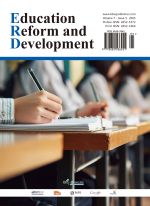Abstract
Childhood is a crucial stage for an individual’s psychological development. Family relationships during this period have a profound impact on children’s psychological and long-term development. The family plays an important role in children’s mental health. It is necessary to focus on creating a harmonious family atmosphere and giving full play to the positive roles of mothers in building children’s trust in the early stage and fathers in promoting the development of children’s moral reasoning ability during adolescence. Based on this, this paper studies the influence of family relationships on children’s psychological development, analyzes the key factors affecting children’s psychological development, such as family atmosphere, parent-child relationship, and parents’ marital quality, and puts forward corresponding suggestions, aiming to provide a theoretical reference for optimizing the family environment and facilitating the healthy psychological development of children.
References
Yang S, Yang L, Li S, et al, 2023, The Relationship Model between Family and School Development Resources and the Psychological Resilience of Left-behind Children from the Perspective of Cumulative Effects. Chinese Social Psychological Review, 2023(2): 157–178 + 316–317.
Xie Q, Chen R, Meng J, 2023, The Relationship between Children’s Psychological Abuse in the Family and Bullying in School: The Mediating Role of Social Support and the Moderating Role of Academic Performance. Juvenile and Children’s Studies, 2023(4): 63–70.
Li X, Wang Y, Sun Y, et al, 2024, The Relationship between Exposure to Domestic Violence and Internalizing and Externalizing Problems of Primary School Students: The Mediating Role of Anger Rumination and the Moderating Role of Gender. Chinese Journal of Clinical Psychology, 32(1): 65–70.
Lin L, He H, Zhang L, et al, 2024, The Relationship between Family Socio-economic Status and Preschoolers’ Learning Quality: The Chain Mediating Role of Parenting Styles and Preschoolers’ Executive Functions. Journal of Shaanxi Xueqian Normal University, 40(11): 9–19.
Song W, Zhang H, Meng L, et al, 2024, The Relationship between Bipolar Affective Disorder in Children and Adolescents and Parenting Styles and Family Environment. International Journal of Psychiatry, 51(5): 1413–1416 + 1441.
Dai W, Wang L, Ren L, 2024, Preschoolers’ Use of Electronic Products: The Predictive Role of Family Factors and Its Relationship with Preschoolers’ Development. Family Education in China, 2024(4): 65–79.
Liang H, Yao J, Zhang M, et al, 2024, Study on the Relationship between Family Relationships, Lifestyle, Food Intolerance and Attention-Deficit/Hyperactivity Disorder in Children and Its Impact on Children’s Intelligence Quotient. Practical Preventive Medicine, 31(7): 833–836.
Wu H, 2024, The Legalization Path of the Transition from Kindergarten to Primary School Education: Taking the Relationship between Kindergarten Education, Family Education and Primary School Education as a Clue. Family Education in China, 2024(3): 17–25.
Han L, 2024, The Relationship between Family Socio-economic Status and Preschoolers’ Learning Quality: The Mediating Role of Educational Involvement and the Moderating Role of Teacher-child Relationships, thesis, Tarim University.
Yang H, Sun F, Li H, 2024, The Relationship between Multiple Family Factors and Middle School Students’ Online Game Addiction Based on Latent Profile Analysis: The Mediating Role of Maladaptive Cognition. Studies of Psychology and Behavior, 22(3): 329–337.
Sun Y, 2024, The Relationship between Family Resilience and Adolescents’ Sense of Meaning in Life: The Roles of Intolerance of Uncertainty and Psychological Resilience, thesis, Guizhou Normal University.
Wang W, Xing S, Bai R, et al, 2024, The Relationship Model between Cumulative Family Risks and Preschoolers’ Problem Behaviors: The Mediating Role of Executive Functions. Acta Psychologica Sinica, 47(1): 220–228.
Zhang X, 2024, The Relationship between Family Economic Status and Adolescents’ Mobile Phone Dependence: A Moderated Mediation Model, thesis, China Three Gorges University.
Ma Z, Yang Y, Su Z, 2024, Sub-groups of Bullying Development in Childhood and Their Relationship with Family Function: A 2-year Longitudinal Study. Chinese Journal of Clinical Psychology, 32(2): 323–329.
Wu E, Mei X, Hu Y, 2024, Research on the Influence of Parent-child Separation on Children’s Social-emotional Competence: The Mediating Role of Family Relationships and Campus Interpersonal Relationships. Journal of Chinese Youth Social Science, 43(2): 111–127.
